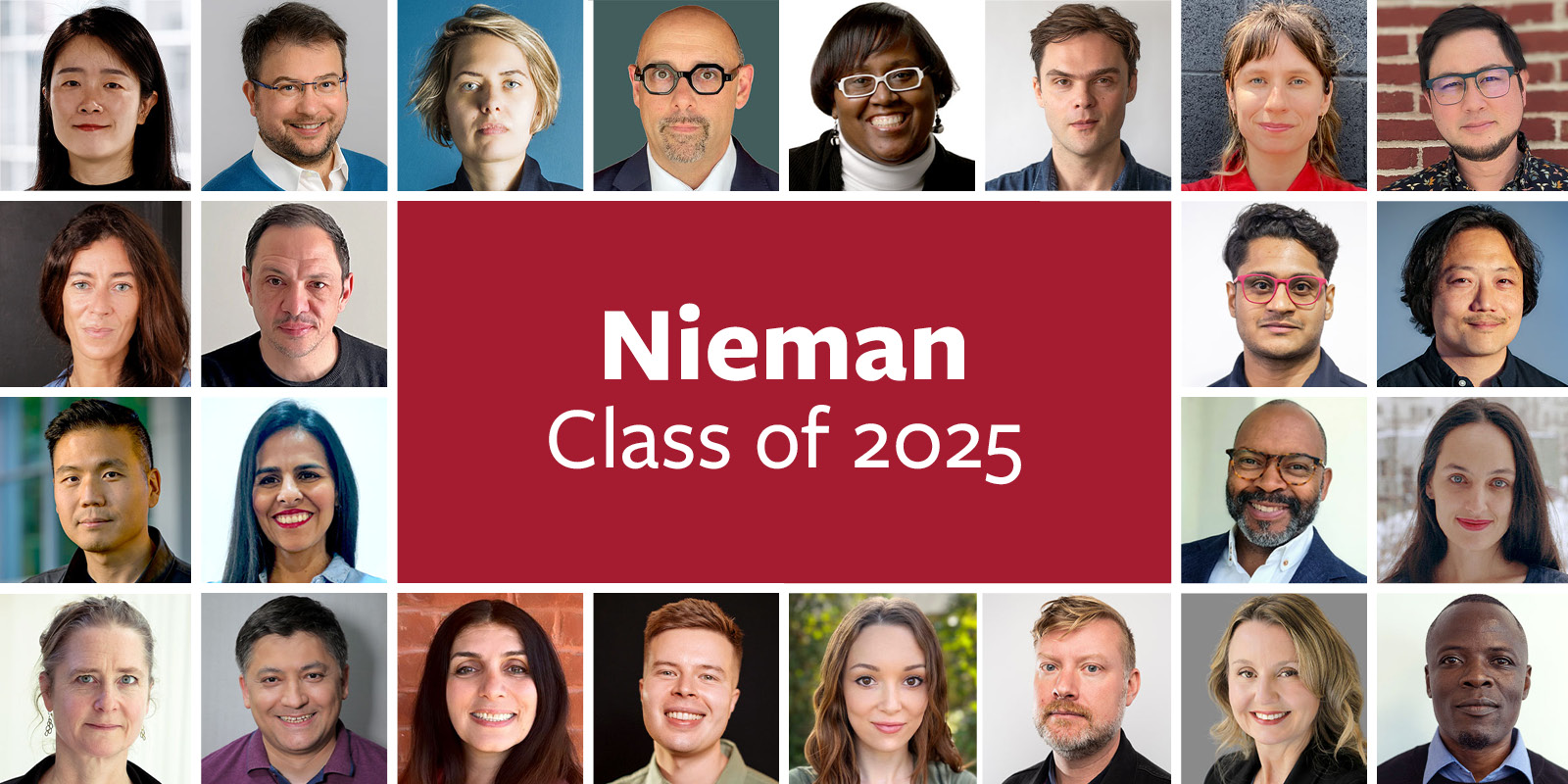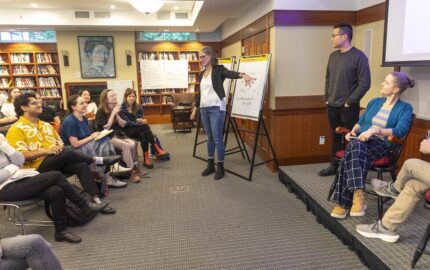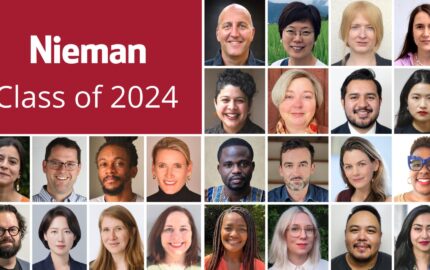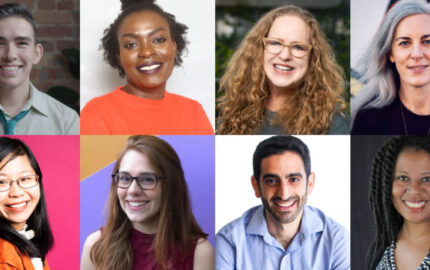The Nieman Foundation for Journalism has selected 24 leading journalists from around the world for two semesters of study at Harvard University, where they will research climate change, the use of artificial intelligence in newsgathering, the proliferation of misinformation, campaigns to silence the free press and other urgent societal and media issues.
The cohort will arrive in Cambridge this fall from throughout the U.S. and a dozen other countries. They represent young digital newsrooms and storied legacy newspapers. They work in film, radio and television. They work alone and independently. And they report on large open-source and cross-border investigations. Two of the fellows are working in exile.
“This dynamic class offers a portrait of the rapidly shifting contours of journalism as a practice and an industry,” said Ann Marie Lipinski, curator of the Nieman Foundation. “They will bring to Harvard innovative ideas for reporting and storytelling and ambitious plans for growing the audience for fact-based journalism. They also represent an industry under threat around the globe, often at the hands of governments seeking to silence journalists. Harvard’s long and steadfast commitment to supporting these fellows and their vital role in a democracy remains a bright light.”
The Nieman Foundation has selected more than 1,700 journalists from 100 countries for fellowships at Harvard since the program began in 1938. Fellows take classes across the university, collaborate with scholars and students at Harvard and MIT and innovators in the Cambridge area, and participate in a rich program of Nieman seminars and workshops.
The 2025 Nieman Fellows and their study plans:
Tyrone Beason is a writer for the Los Angeles Times’ environment, climate, health and science team whose work includes reporting on Indigenous land issues. He will study land reclamation efforts and conservation movements in the U.S. as well as the roles of race and identity in our political discourse.
@tyrone_california
Kyrylo Beskorovainyi, co-founder and publisher of the Ukrainian popular science media outlet Kunsht will study how to sustain and improve fact-based science reporting and counter disinformation during times of war and social crisis.
@KBeskorovayny
Benjamin Bidder, an economics reporter for the German news magazine Der Spiegel, will study the causes of social division and the devaluation of fact while researching strategies media can use to communicate effectively during political polarization.
@BenjaminBidder
Lina Chawaf, CEO of Radio Rozana, an independent Syrian media network broadcasting from France about conflict in her home country with a focus on women’s voices, will research how to support women media leaders who are working in conflict zones while battling gender stereotypes and taboos.
@LinaChawaf
Nilesh Christopher, a journalist and former engineer from India who writes about technology, business and culture,will research AI-generated audio and video content and how U.S. newsrooms combat deepfakes in politics. He will create a playbook for local newsrooms in India for testing and verifying manipulated content.
@NilChristopher
Jon Collins, a senior reporter covering the future of public safety for MPR News in Minneapolis, will examine how traditional policing policies disproportionally target the poor and why economic disparities are widening in the U.S.
@jonscollins
Jesselyn Cook, an Atlanta-based reporter and author, will examine how to improve children’s access to quality news, shield them from fake news online and proactively forge a healthier relationship between the next generation and media.
@JessReports
Diana Durán Nuñez, most recently a reporter for the TV news magazine “Los Informantes” on Caracol Televisión in Colombia and for The Washington Post, will research recent human rights abuses by Latin American governments carried out under the guise of legal operations.
@dicaduran
Anna Filipova, a visual journalist and filmmaker who lives in the Arctic, will study climate change and globalization and examine new technologies to aid storytelling about the polar regions.
@Anna_Filip
Bianca Giaever, an independent radio journalist and filmmaker based in Vermont, will study the intersection of religion and climate change with a specific focus on how religious and cultural worldviews impact the way individuals perceive and respond to the climate crisis.
@biancagiaever
David M. Herszenhorn, the Russia, Ukraine, East Europe editor for The Washington Post, will study models of transnational governance, their failure to prevent armed conflict and prospects for reform to secure peace, protect human rights and promote diversity and equality in global leadership and policymaking.
@herszenhorn
Ryan Y. Kellett, vice president of audience at Axios Media, will study the economic and cultural incentives of social media platforms and the role online creators play in disseminating fact-based journalism.
@rkellett
Elena Kostyuchenko, an exiled Russian journalist who collaborates with Meduza, an independent Russian news organization based in Latvia, will study postcolonialism, folklore and research on death and trauma.
@mirrorsbreath
Lasha Kveseladze, an investigative journalist for the broadcast media company Mtavari Channel and co-founder of the Journalistic Data Processing Centre in Tbilisi, Georgia, will study open-source tools and Russian influence over the Caucasus.
@Kveso
Robert Libetti, an executive producer for The Wall Street Journal where he leads video investigations and documentaries, will study the intersection of open-source research, traditional journalism and documentary filmmaking.
@RobLibetti
James Okong’o, a digital reporter for Agence France Presse in Kenya, will study the relationship between online influence and coordinated disinformation campaigns in sub-Saharan Africa with a focus on operations to weaponize information in Kenyan elections.
@okongojim
Ben Reininga, head of editorial at Snapchat, will focus on the rise of creator journalists on social platforms, identifying responsible ways to harness growing audience interest while maintaining credibility.
@BenReininga
Sandrine Rigaud, most recently editor-in-chief of Forbidden Stories, a global network of journalists protecting and publishing the work of journalists under threat, will research how to make cross-border investigations more accessible to journalists around the world, including in countries where press freedom is threatened.
@sandrinerigaud
Darcel Rockett, a senior journalist at the Chicago Tribune, will examine the impact of the Supreme Court’s reversal of affirmative action in higher education and the repercussions of the decision on the future of the Black middle class.
@DarcelTribune
Mike Shum, a director, producer, and cinematographer for PBS’ “Frontline,” will research the landscape of journalism and press censorship in the global Chinese diaspora, with a focus on Hong Kong and Macau and the evolution of censorship that shaped the identity of the region over five decades.
X: @MikeShumFilms Instagram: @mike_shum_
Gina Smith, the investigations and projects editor for McClatchy’s South Carolina newspapers and founder of the nonprofit SC Investigates, will research best models for sustaining training in support of accountability reporting at the local news level.
@GinaNSmith
Line Vaaben, an editor and immersive journalist at the Danish daily newspaper Politiken, will study trauma-centered reporting and PTSD, focusing on how to cover intense human stories while building resilient newsroom cultures to counter emotional fatigue and burn out.
@livaaben
Marcus Yam, a foreign correspondent and photojournalist with the Los Angeles Times, will explore new frameworks for covering war and fostering empathy and undertake studies in a range of writing genres including narrative storytelling and opinion writing.
X: @yamphoto Instagram: @yamphoto
Albee Zhang, a correspondent for Reuters in China, will examine China’s international ambitions and their impact on world order. After studying at Harvard, Zhang will begin a nine-month reporting fellowship with The Associated Press as part of a Nieman-AP partnership supported by Schmidt Futures.
The 2025 Nieman Fellows were selected by Nieman Foundation curator Ann Marie Lipinski; 2023 Nieman Fellow Natasha Khan, a business reporter at The Wall Street Journal; 1997 Nieman Fellow and Nieman Advisory Board member Robert Blau, executive editor for projects and investigations at Bloomberg; Corinne Chin, director of news talent for recruitment at The Associated Press; and Ron Nixon, AP’s vice president for news and head of investigations.
The Nieman Foundation for Journalism at Harvard educates leaders in journalism, promotes innovation and elevates the standards of the profession. In addition to its fellowship program, the foundation publishes Nieman Reports, a website and print magazine covering thought leadership in journalism; Nieman Journalism Lab, a website reporting on the future of news, innovation and best practices in the digital media age; and Nieman Storyboard, a website showcasing exceptional narrative journalism and nonfiction storytelling.



